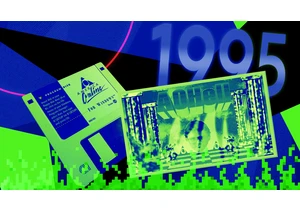Last week, as part of his apparent ongoing campaign to rebrand himself as a more Musk-like figure, Meta CEO Mark Zuckerberg sat down with Joe Rogan for ">a three-hour discussion about free speech, government “censorship,” and how important it is that American companies win the AI race. But one of the other topics Zuck seemed intent to focus on was Apple.
The Facebook founder aired many of his beefs with the company, particularly his displeasure regarding the fees that some developers need to pay on Apple’s App Store to distribute their wares on the platform (fees that Apple cut in half for small developers). Yet Zuck went even further, suggesting the Cupertino company isn’t the innovative powerhouse it once was—and it hasn’t been for decades.
“It’s like Steve Jobs invented the iPhone and now they’re just kind of sitting on it 20 years later,” Zuckerberg said, later adding, “And I’m pretty optimistic that just because they’ve been so off their game in terms of not really releasing many innovative things, that eventually . . . if you just don’t do a good job for like 10 years, eventually, you’re just going to get beat by someone.”
A matter of privacy
Zuck’s comments about Apple’s supposed lack of innovation are baffling, especially coming from someone as knowledgeable about the tech industry and its progress over the past several decades as he is. But his comments are much easier to understand if you consider the degree to which Apple’s most important innovation over the past ten years has harmed Meta’s business practices.
Zuckerberg seems to believe that hardware advancements are the only ones that count as “innovation” at Apple. But I don’t think it’s fair to limit Apple to such a narrow scope. After all, the company isn’t just a hardware company. It makes software and provides services, which all encompass an ecosystem that is unlike any other in the tech industry. It is an ecosystem that offers convenience, intuitiveness, and interoperability. And most importantly, it is an ecosystem that has revolutionized digital privacy.
Apple’s greatest innovation over the last decade isn’t something we can hold in our hands or show off to someone else. It’s our power to keep more of our data away from the corporations and institutions seeking to harness our thoughts, locations, and connections for their own financial gain. Accessing and monetizing this information about us is Meta’s bread and butter, and many of the privacy innovations Apple has introduced to its ecosystem in recent years have harmed Meta’s ability to do this.
Innovation after innovation
Take, for example, just one of Apple’s recent privacy innovations in iOS 18—the ability for users to restrict app access to only the contacts they choose. Social media giants like Meta hate this feature, because it means they can no longer gain unrestricted access to everyone in your address book—to your friends, doctors, and religious leaders. This means that they lose control over knowing everyone you know and can’t build a complete social graph for you.
Or take App Tracking Transparency (ATT), a privacy feature first introduced in iOS 14.5. ATT gave users control over whether an app would be allowed to track them across third-party apps and websites. This is a feature that faced strong opposition from companies, including Meta’s Facebook, that had business models that relied on selling your information. But it’s a feature that users have embraced overwhelmingly, with May 2021 data showing 94% of U.S. iPhone owners opting into ATT to prevent their tracking.
More recently, Apple completely innovated the AI game by creating an entirely new technology called Private Cloud Compute that allows users to use its Apple Intelligence chatbot features without having their personal information or even past queries collected and retained by Apple or anyone else. This is the first time a major artificial intelligence provider has given users this level of privacy with an AI service, something you won’t find with Open AI’s ChatGPT (well, unless you’re using it via Apple Intelligence) or Meta’s Llama 3-based Meta AI. Heck, Meta makes it hard for users to just opt out of their data being used to train its AI.
These are just three of the dozens of major privacy innovations Apple has announced in recent years. Understanding how critical personal privacy will be in an increasingly intrusive world in the years ahead, it is ridiculous to say that Apple has not innovated much since the iPhone. Apple’s iPhone was a once-in-a-generation—maybe more—cultural grand slam of a device. But Apple’s non-tangible privacy innovations since then are a far more important revolution: They help us keep vital parts of ourselves away from prying eyes like Meta’s, a company more than happy to sell our information to the highest bidder here or abroad.
Mark Zuckerberg’s blind spot
It seems unlikely that privacy would be as hot a topic in the personal tech space if it were not for Apple embracing it. As far as I can gather, it is the only major tech giant that not only doesn’t try to hinder privacy but actively designs its products around it. And because it does this—and markets it all so well—the importance of digital privacy is elevated in consumers’ minds, which forces other tech companies to (however begrudgingly) copy some of their innovations. In this way, even if you don’t use Apple’s products, Apple’s innovations in the privacy space are benefitting you.
As we move to a world where everything is connected and all-seeing AI is everywhere, privacy innovation is exactly the kind of innovation we need right now. And it is an arena where Apple currently excels.
But if Zuck is still stuck on hardware-only innovation, he might stop to consider the Apple Watch and its numerous game-changing health features; Apple Pay, which brought contactless payments to the masses; Face ID, the most secure and user-friendly consumer biometric authentication out there; and Apple Silicon, the most powerful consumer chips in the world, which have enabled all sorts of new computer designs—just to name a few.
These are innovations I see people using every day. Surely, Zuckerberg must see it, too.
Войдите, чтобы добавить комментарий
Другие сообщения в этой группе

This is an edition of Plugged In, a weekly newsletter by Fast Company global technology editor Harry McCracken. You can sign up to receive it each Friday and read all issues



Big changes are coming to the web in the days ahead. On July 25, the U.K.’s Online Safe

For search and rescue, AI is not more accurate than humans, but it is

The new must-have pet accessory? A concrete slab.
On #CatTok, videos are racking up views as cat owners bring slabs into their homes, set them down, and watch their beloved pets sniff, l

